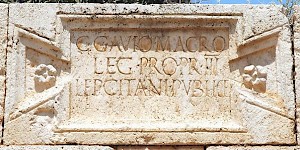Propraetor
Propraetor: Roman magistrate, former praetor in charge of a province.

Like a proconsul, the propraetor was someone who acted as if (pro) he were an official magistrate. He had all the powers of a praetor, but was, in fact, a former praetor whose term in office was prolonged (prorogatio).
The oldest known propraetor was in 241 BCE; the office became popular after the war against Hannibal. After the age of Sulla, all praetors were supposed to leave the city after their year in office, and to rule a province as propraetor. From then on, propraetor was a normal rank of the governor of a Roman province.
The emperor Augustus was, officially, governor of many provinces, which he ruled through envoys, who were called legatus Augusti pro praetore. They served typically thirty-six months.
The commanders of the Roman legions were called legatus legionis, and could have propraetorian powers.